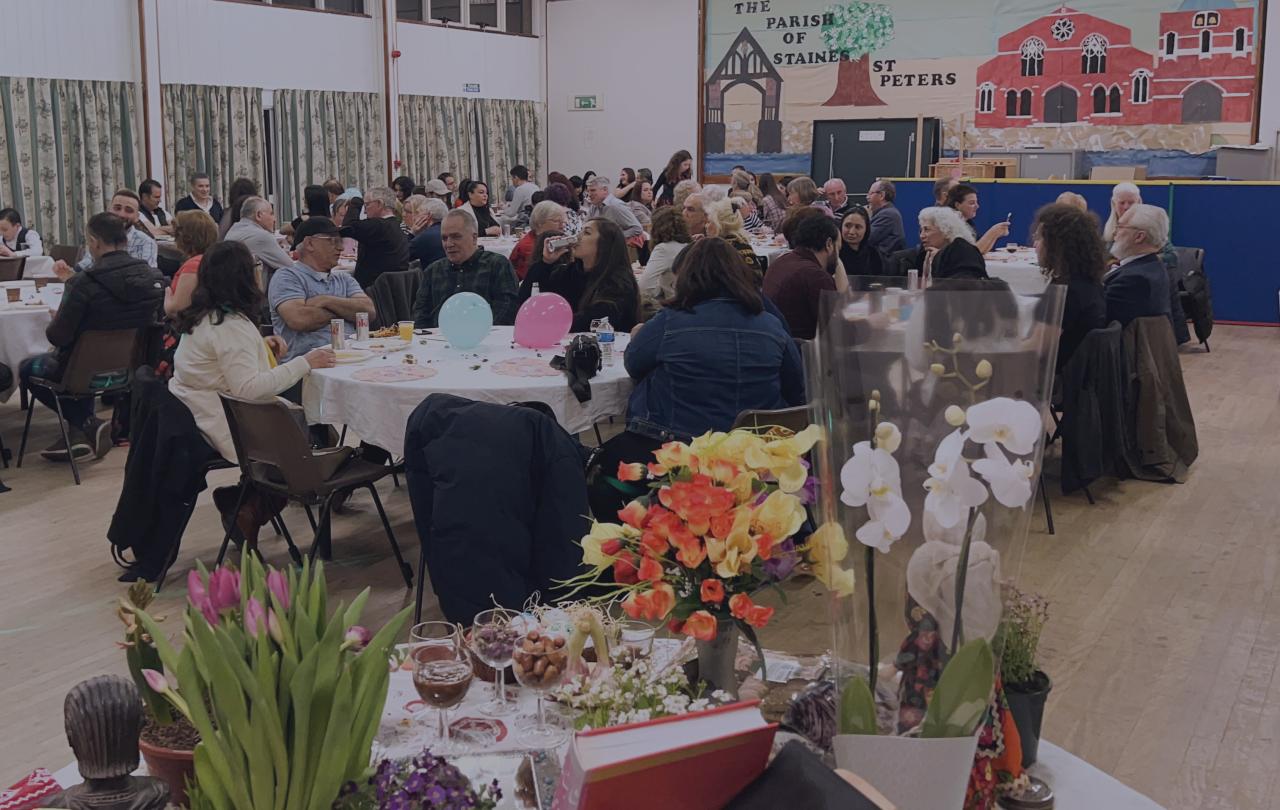
There is one job at Christmas I always forget I have to do. It’s the one where you get the Christmas tree home only to realise that, if it isn’t going to be dead of dehydration by Christmas Eve, some chump has to saw one inch off the bottom of it. In my mind there is another version of myself who is admirably skilled and handy at things like this. That Roger- let’s call him manly-Roger- has a neatly ordered garage full of power tools ready for any task, and a set of multi-sized saws hanging outlined by a perfect silhouette on the wall. Unfortunately, this Roger- let’s call him real-Roger- does not own that garage. To give you an idea of just how chaotic our garage is, the police once woke us up at 3am to tell us it had been broken into and trashed by burglars. When I joined them in my dressing gown to inspect the ‘crime scene’, it turned out the kids had left it open, and I was forced to confess that our garage always looks like that.
So as the rest of the family disappear into the house, pinning up lights in a joyous cacophony of festive music, I’m swearing in the garage trying to find a saw. It’s usually completely inaccessible; wedged under a leaf blower, a bottle of windscreen fluid, and some discarded dumbbells which manly-Roger, were he to exist, might have actually used. Eventually I’ll emerge brandishing something completely ill-fitting for the task- some garden secateurs, a metal file, or a rusty axe, and I’ll then spend the next twenty minutes sweating over the base of the Christmas tree, thinking it all would have been much easier if real-Roger had bothered to pick up those dumbbells more than once this year. If a bad workman blames his tools, a truly abysmal workman has no clue what his tools even do. By the time I’ve finished clipping, hacking, and filing, the base of the tree looks not so much neatly sawn as gnawed-by-a-passing-beaver. I enter the house like a war hero flushed and dirtied from battle, defeatedly clutching the mangled tree. It requires every spare inch of inner resolve not to declare Christmas cancelled.
When I was a kid Christmas seemed so much easier. It was something that just happened. The festive magic occurred as if by magic. It took me longer than it should have to realise that Christmas only happens because someone makes it happen- and when you have kids and family that someone, is you. Given my incompetence with Christmas trees then, it may come as a surprise to know that I’ve learned to love being part of Team Christmas, being part of the gang who are in on the act and can make the magic happen. (And not just because our teenage sons reckons I look like Arthur Christmas in our wedding photos.) I have learned that there is, just beneath the surface, a bone-deep satisfaction in the hard work of hosting Christmas at home. It has become a spiritual discipline for me, and I should probably explain why.
We go into Christmas knowing that this year there is joy and beauty to be found in responding to other people’s demands.
Ronald Rollheiser, in his book Domestic Monastery, tells the story of a monk who followed the call to prayer deep into the solitude of the Sahara Desert. His name was Carlo Caretto, and after all his spiritual exertions and mystical extremes, he reflected that he was still no holier, no more godly, no less selfish than the mother he had left at home. His view was that the very act of raising children and constantly responding to the needs of the household had shaped her, even more effectively than the desert winds, into the attentive caring presence he had come to know. Rollheiser extends this story to us all. In the monastery, life is ordered by the monastery bell. When it rings the monks turn to prayer. Whatever they are doing – eating, speaking, half-way through a sentence – they stop and turn their attention immediately to God. Rollheiser suggests that we view the demands and interruptions of home and work just like this, as the monastery bell inviting us to turn to whatever is demanded of us in that moment. In doing so, we find ourselves shaped, like Caretto’s mother, into a more gracious and attentive form.
Christmas, more than any other time of year, has started to have a similar effect on me. When people need food or drink, when the presents need to be wrapped, when board games are needed for entertainment, when fresh air is needed to break the monotony, when someone needs to talk… I hear the sound of the monastery bell. The demands can be relentless, and easy to resent, but I have come to find some delight in willingly responding to them without a second thought.
Psychologists have written something similar about the things that motivate us towards being at our best. Self Determination Theory for example, holds that there are three basic psychological needs to which we are all intrinsically drawn. They are the conditions for feeling that what we do was initiated by us and hasn’t been imposed by the tyranny of our circumstances.
The first is autonomy. We have to feel on some level that we chose to do what we are currently doing. This is where the monastery bell can be so helpful at Christmas. We may not have chosen our families or the place of our birth, but we can choose how we respond to the obligations these things place upon us. As the guru of meaning, Viktor Frankl once said, we should not ask what the meaning of our lives is, because in the duties and demands of each day, life itself is constantly questioning us. Meaning is to be found in how we respond. Whether we are willing to do the things we have to do, as if we chose to do them. This is an intention we can set for ourselves long before the family rock up for Christmas dinner. We go into Christmas knowing that this year there is joy and beauty to be found in responding to other people’s demands. We only make ourselves miserable by imagining a world where we only ever call the shots and never have to serve them. Like the proverbial puppy, autonomy is not just for Christmas… it’s for life.
Some of our best memories of Christmas can be the conversations we had while cooking, or washing up, or serving drinks, or setting the table. If we find it difficult to ask for help, we may need to set up the request in advance.
It’s all very well claiming our intention to serve the family at Christmas, but if we don’t brace ourselves for it, it’s liable to collapse with the first person to turn down our homemade cranberry sauce (it’s a long story- see Unwrapping God this Christmas Part 1). We can choose our duty, but we don’t have to choose it alone. This speaks to our second psychological need: relatedness. We want to connect with other people, to make contact and build relationships. Doing our duty at Christmas is great, but we need to watch out for that subtle moment when our delight at serving others morphs into stomping around wishing we didn’t have to. Often this is because we ignored the moment at which we probably should have asked for help. We start to feel alone in serving and, even worse, we start mentally rehearsing all the reasons why the rest of our family are useless wasters who never lift a finger.
We need to be attentive to the pivot point at which our desire to serve turns into martyrdom, and not be seduced by the moral superiority of going it alone. If we can learn to ask those around us to help when we need it, we can create unanticipated times of connection. Some of our best memories of Christmas can be the conversations we had while cooking, or washing up, or serving drinks, or setting the table. If we find it difficult to ask for help, we may need to set up the request in advance. We let the family know that at some point during Christmas it will all feel a bit too much and we need them to be ready to help. In our house, at such times my other half has ‘permission to boss’. Given that she is more likely than me to be aware and stressed out by what needs to be done, she is free to point it out. And if, at times, that comes across a bit bossy, it’s no big deal- just Team Christmas working together to get things done.
And, if the theory is right, getting things done is the third psychological need (alongside autonomy and relatedness) that motivates positive behaviour. We like to find outlets for our competence, our skills and abilities. To listen out for the monastery bell is to ask ourselves the question: what am I able to do in this moment that would contribute to hosting the family right now? And for me, ultimately, that’s what makes the practice of Christmas a spiritual discipline. A few hundred years ago the Jesuit spiritual director, Jean-Pierre de Caussade (1675-1751), grew tired of convoluted esoteric paths to spiritual enlightenment. He preferred a much more down to earth approach. He wrote: the duty of every moment is a shadow that conceals the action of God. Sometimes we miss God because we are put off by the shadow that conceals the divine presence in everyday life. But when we approach the demands of the festive season, willing to give what we have, to whomever we can, we celebrate once again this Christmas, in our own small way, the coming of heaven to earth.





